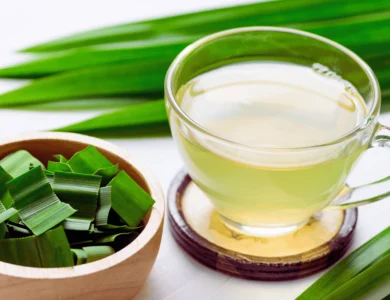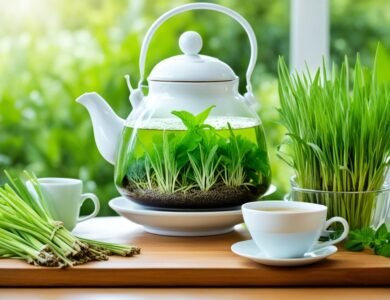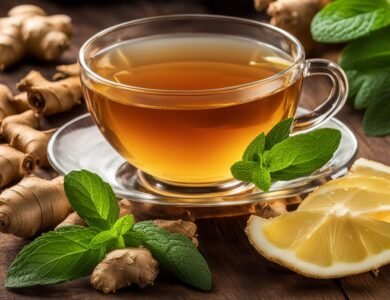
Mushroom teas have gained popularity in recent years, thanks to endorsements from celebrities and health influencers. However, mushrooms have been utilized for their medicinal properties in Eastern medicine for centuries. Mushroom tea is not your typical beverage but rather a supplement made from powdered mushroom extracts blended with tea or coffee.
The mushrooms typically used in these teas, such as Chaga, lion’s mane, and reishi, are considered adaptogens that help the body adapt to stress and boost the immune system. While modern research on adaptogenic mushrooms is still in its early stages, there is a rich history of traditional medicinal use. Mushroom teas offer potential health benefits, including boosting immunity and promoting overall wellness.
Explore the fascinating world of mushroom teas and discover how they can contribute to your well-being. From the cognitive and relaxation benefits to their antioxidant properties, there’s a lot to learn about these powerful fungi. Join us on this wellness journey as we uncover the secrets of mushroom teas and their potential to nurture a healthier, more balanced lifestyle.
The Cognitive Benefits of Mushroom Tea
Aside from their immune-boosting properties, mushrooms in tea form may also offer cognitive benefits. Some preliminary studies suggest that mushroom extracts could potentially aid in fighting cancer and slowing tumor growth. Additionally, mushrooms are rich in antioxidants, which play a role in preventing chronic diseases and may lower the risk of conditions like depression.
The phytochemicals in mushrooms have also shown promise in improving gut health and changing the composition of the gut microbiome. While the research is ongoing and more extensive human studies are needed, mushroom tea’s cognitive benefits are worth exploring.
Antioxidants for Cognitive Health
- Antioxidants in mushrooms help protect brain cells from oxidative stress.
- Oxidative stress has been linked to cognitive decline and neurodegenerative diseases.
- Including antioxidant-rich foods like mushrooms in your diet may help support brain health.
Phytochemicals and Neuroprotection
- Phytochemicals found in mushrooms have shown potential neuroprotective effects.
- These compounds may help reduce inflammation and oxidative damage in the brain.
- Reducing inflammation in the brain is believed to support cognitive function and overall brain health.
While more research is needed to fully understand the cognitive benefits of mushroom tea, incorporating mushrooms into your diet can contribute to overall well-being and potentially support brain health.
The Relaxation Benefits of Mushroom Tea
Mushroom tea is not only beneficial for physical health but can also contribute to relaxation and stress relief. The adaptogenic properties in mushrooms, such as Chaga, lion’s mane, and reishi, can help calm the central nervous system and moderate the body’s response to stress.
While research on the specific relaxation benefits of mushroom tea is limited, anecdotal evidence suggests that people may experience increased energy and an overall sense of well-being after consuming it. The combination of mushroom extracts and tea or coffee in mushroom tea blends may help promote relaxation and a sense of calmness.
It’s important to note that these relaxation effects may also be attributed to the presence of caffeine in certain mushroom tea blends. Caffeine is known to have stimulating properties that can provide temporary stress relief and promote relaxation.
Overall, incorporating mushroom tea into your routine may contribute to stress reduction and relaxation. However, individual experiences may vary, and it’s recommended to consult with a healthcare professional before adding mushroom tea to your wellness regimen.
To learn more about the benefits of mushroom tea, take a look at the Types of Healthful Mushrooms section below.
Image:
The Antioxidant Properties of Mushroom Tea
Mushroom tea offers more than just a comforting beverage. It is packed with antioxidants that provide numerous benefits for your overall health and well-being. Antioxidants play a crucial role in protecting the body against free radicals and oxidative stress, which can lead to various diseases and premature aging.
One of the mushrooms commonly used in mushroom tea, Chaga, is particularly rich in antioxidants. It contains high levels of black pigment and polyphenols, which are powerful compounds known for their antioxidant properties. These antioxidants help to neutralize harmful free radicals and reduce inflammation in the body.
The antioxidant properties of mushroom tea have been linked to supporting the immune system, promoting heart health, and improving gut health. By incorporating mushroom tea into your diet, you can potentially enhance your body’s defense against oxidative stress and bolster your overall well-being.
Mushroom tea continues to be studied to fully understand the extent of its antioxidant properties. Ongoing research aims to uncover more about the specific antioxidants present in different mushroom varieties and their potential health benefits.
Benefits of Antioxidants:
- Reduced inflammation: Antioxidants help to combat inflammation in the body, which is linked to various chronic conditions.
- Enhanced immune function: Antioxidants support a healthy immune system, aiding in the body’s ability to fight off infections and diseases.
- Promoted heart health: Antioxidants have been associated with reducing the risk of heart disease by protecting against oxidative damage to the cardiovascular system.
- Improved gut health: Antioxidants can have a positive impact on the gut microbiome, which plays a crucial role in digestion and overall health.
While more research is needed to fully understand the antioxidant properties of mushroom tea, incorporating it into your diet can be a simple and enjoyable way to boost your antioxidant intake. As always, it’s important to consult with your healthcare professional before making any significant changes to your diet or wellness routine.
Types of Healthful Mushrooms
When it comes to medicinal mushroom teas, there are several types of mushrooms that offer unique health benefits. Incorporating these mushrooms into your tea can provide a delicious way to support your well-being.
1. Chaga Mushrooms
Chaga mushrooms are well-known for their cancer-fighting potential and their ability to support the immune system. These mushrooms are often blended with tea or coffee, creating a flavorful and healthful beverage.
2. Lion’s Mane Mushrooms
Lion’s mane mushrooms have shown promise in improving cognitive function and supporting brain health. Enjoying lion’s mane mushroom tea may help enhance mental clarity and focus.
3. Reishi Mushrooms
Reishi mushrooms are revered for their adaptogenic properties and their potential to boost the immune system. By incorporating reishi mushroom tea into your routine, you may experience enhanced well-being and resilience.
4. Other Varieties
There are many other varieties of mushrooms that can be beneficial when used in tea. Cordyceps, tremella, turkey tail, and shiitake mushrooms also offer their unique health benefits, from supporting athletic performance to promoting heart and gut health.
When preparing medicinal mushroom tea, it’s important to use powdered mushroom extracts rather than fresh mushrooms. This ensures that you get the concentrated dose of beneficial compounds that these mushrooms provide.
Experimenting with different combinations of mushrooms and incorporating them into your tea routine can be an enjoyable and healthful way to support your overall well-being.
Potential Health Risks and Interactions of Mushroom Tea
While mushroom tea offers potential health benefits, it’s important to be aware of the potential health risks and interactions associated with its consumption. These factors should be taken into consideration before incorporating mushroom tea into your wellness routine.
Reduced Nutrient Absorption from Oxalates
Some mushrooms, such as Chaga, contain oxalates that have been known to reduce nutrient absorption in the body. This may be of concern for individuals who are already at risk of nutrient deficiencies or who rely heavily on nutrient absorption for their overall health.
Interactions with Medications
It’s essential to be cautious about potential interactions between mushroom tea and certain medications, especially blood thinners and chemotherapy drugs. Mushroom tea may interfere with the effectiveness of these medications or cause unintended side effects. To ensure your safety, it is crucial to consult with a healthcare professional before incorporating mushroom tea into your routine.
Lack of Regulatory Oversight
The U.S. Food and Drug Administration (FDA) does not regulate mushroom tea as rigorously as conventional medications. This means that the quality and safety of mushroom tea products may vary. It is important to research reputable brands and consult with healthcare professionals to make informed decisions about the safety and efficacy of mushroom teas.
Individual Reactions and Variability
Individual reactions to mushroom tea may vary. What works well for one person may not necessarily have the same effect on another. Factors such as personal health conditions, allergies, and sensitivities can influence how individuals react to mushroom tea. It’s advisable to start with small quantities and observe your body’s response before incorporating mushroom tea into your daily routine.
Is Mushroom Tea Worthwhile?
As the popularity of mushroom tea continues to grow, many people wonder if it is truly a worthwhile wellness trend. While there is ongoing research exploring the benefits of mushroom tea, mushrooms themselves are already considered a healthy addition to most diets. However, it is important to approach mushroom tea with caution and consult with your doctor or healthcare team before incorporating it into your routine, especially if you have underlying health conditions or are taking medications.
Mushroom tea can be a valuable part of a balanced wellness routine, but it should not be seen as a quick fix for health problems. Instead, it should be approached as a potential supplement to support overall well-being. It is essential to remember that while mushroom tea may offer potential benefits, focusing on the basics of a nutrient-rich diet and regular physical activity is key to maintaining good health.
When considering the worthiness of mushroom tea, it’s crucial to evaluate your individual health needs and goals. By discussing mushroom tea with your healthcare provider, you can determine if it aligns with your unique circumstances and whether it may complement other treatments or lifestyle modifications you are implementing. Remember, everyone’s body reacts differently to substances, so what may work for one person may not work for another.
Ultimately, incorporating mushroom tea into your wellness routine may provide an enjoyable and healthful experience. However, it’s important to remember that it is just one aspect of a holistic approach to well-being. By focusing on a comprehensive approach that includes mindful eating, regular physical activity, and an overall healthy lifestyle, you can maximize the potential benefits of mushroom tea and enhance your overall wellness.
How to Enjoy Mushroom Tea
Are you ready to experience the delightful and healthful benefits of mushroom tea? There are various ways to prepare and enjoy this unique beverage, depending on your personal preferences and the brand you choose.
Some mushroom teas come as blends that include whole, ground mushrooms, allowing you to fully experience their flavor and texture. Others involve a traditional steeping process where you extract the beneficial compounds without actually consuming the mushrooms themselves.
To enhance the flavor and add extra benefits, certain mushroom tea blends may include additional ingredients like tea leaves, spices, and herbs. These ingredients not only offer a delightful taste but also contribute to the overall wellness experience.
When preparing mushroom tea, it’s important to read and follow the instructions provided by the brand. Each brand may have specific guidelines for the best preparation. Whether you choose to make your own homemade mushroom tea or purchase pre-mixed varieties, the key is to follow the instructions and savor the experience of incorporating mushroom tea into your routine.
Sources
- everydayhealth.com/diet-nutrition/mushroom-tea-will-it-make-you-healthier/
- realsimple.com/mushroom-tea-benefits-7499595
- webmd.com/diet/health-benefits-chaga-tea




